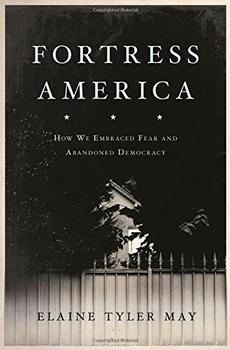Summary | Excerpt | Reviews | Beyond the Book | Readalikes | Genres & Themes | Author Bio

 Book Reviewed by:
Book Reviewed by:
Kate Braithwaite
Buy This Book
Domestic security appeared to be threatened not only by Cold War dangers, economic woes, and urban upheavals but also by the social and political challenges to the racial and gender status quo that took shape in the 1960s. The economy weakened just as the civil rights and feminist movements began to force the government and employers to grant greater opportunities and a more equitable legal status for racial minorities and women. While the successes of the civil rights and feminist movements changed millions of lives for the better, they also caused considerable anxiety for many whose lives had been ordered by time-honored racial and gender inequalities. Coming at a time of increasing economic instability, these developments gave rise to new fears.
With rising crime and urban unrest making headlines, and feminism, civil rights, the counterculture, and the sexual revolution turning the traditional domestic order upside down, political leaders and the mainstream media fanned fears with calls for "law and order." They revived fictitious tropes of racial danger that had prevailed for centuries, especially in the South, promoting unfounded assertions that black men were dangerous and white women were vulnerable. Media messages warned women to stay home and avoid city streets, when statistically they were safer outside than in their own homes, where most violence against women occurred. Many women absorbed these messages and changed their behavior in order to avoid attack, or learned how to defend themselves if assaulted.3
Precautions to avoid harm are, of course, a normal part of life. But when fears become exaggerated or misdirected, they can be harmful to individuals and to society. In the United States, "security" in the last decades of the twentieth century came to mean a particular kind of safety, safety from the threat of physical violence from strangers. For the vast majority of citizens, "stranger danger" has never been a serious threat. Most physical harm to Americans comes at the hands of people they know.
Still, most Americans took for granted the daily rituals of security culture: the avoidance of certain streets, the reluctance to walk alone at night, the many locks on doors and the installation of security systems, the private security guards, the importance of personal firearms. Few stopped to think whether any of these measures actually provided personal safety, and whether there might be different strategies for improving the well-being of all.
HOW DID THIS happen? There is no single "cause" of the security obsession that emerged in the second half of the twentieth century. There were many factors involved, and many dimensions to the fears that led millions of Americans to seek safety from perceived dangers. Uncovering this history requires delving into a wide range of sources. Fear is not only a response to reality, such as the development of nuclear weapons, economic insecurity, urban unrest, or the presence of crime. It is also fostered by messages carried in the news media, Hollywood films, and political speeches, and spread by businesses seeking to profit from fear. Hence this book relies not only on public opinion data, but also on the view of American life reflected in blockbuster movies, such as the Dirty Harry films, and not only on crime statistics, but also on the rhetoric of politicians who exaggerated danger to create fear.
Insightful observers have examined various aspects of our nation's culture of security. Many scholars have studied the impact of US foreign policy, and some have argued persuasively that our military adventures around the world in the name of national security have actually made the United States less safe, while causing untold death, destruction, and misery. Others have written extensively about the many misguided efforts to limit or cut off immigration and seal the nation's borders, and the disastrous consequences of an unnecessarily punitive criminal justice system.
Excerpted from Fortress America by Elaine Tyler May. Copyright © 2017 by Elaine Tyler May. Excerpted by permission of Basic Books. All rights reserved. No part of this excerpt may be reproduced or reprinted without permission in writing from the publisher.





The Flower Sisters
by Michelle Collins Anderson
From the new Fannie Flagg of the Ozarks, a richly-woven story of family, forgiveness, and reinvention.

The House on Biscayne Bay
by Chanel Cleeton
As death stalks a gothic mansion in Miami, the lives of two women intertwine as the past and present collide.

The Funeral Cryer by Wenyan Lu
Debut novelist Wenyan Lu brings us this witty yet profound story about one woman's midlife reawakening in contemporary rural China.
Your guide toexceptional books
BookBrowse seeks out and recommends the best in contemporary fiction and nonfiction—books that not only engage and entertain but also deepen our understanding of ourselves and the world around us.